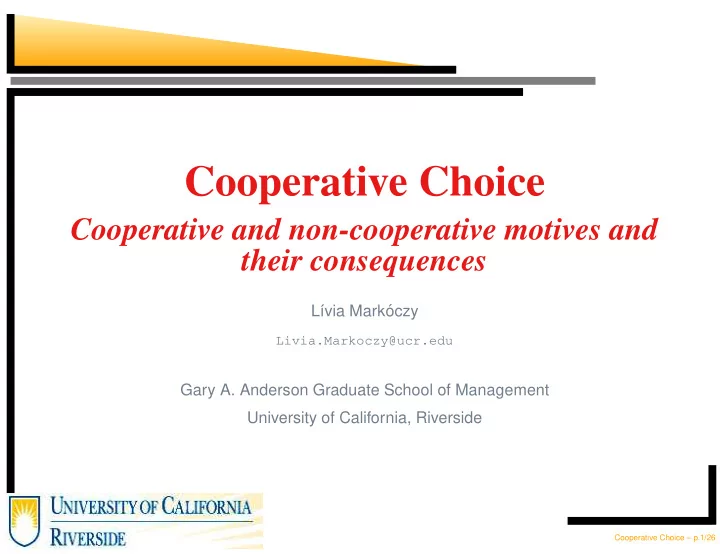

Cooperative Choice Cooperative and non-cooperative motives and their consequences ıvia Mark´ L´ oczy Livia.Markoczy@ucr.edu Gary A. Anderson Graduate School of Management University of California, Riverside Cooperative Choice – p.1/26
Current trends in org. studies Focus is on social context and away from individual factors Also true for cooperation studies. Little focus on individual differences. Cooperative Choice – p.2/26
This presentation To discuss the multiplicity of cooperative motives that affect cooperative choices in the context of a social dilemma. Cooperative Choice – p.3/26
Road map of presentation Using social dilemmas to study cooperation Critique of three current approaches 1. Individualistic vs. Collectivist cultures 2. Self-interest 3. Situational determinism Multiplicity of motives Ways of talking about these motives Directions for the future work Cooperative Choice – p.4/26
Social Dilemmas A social dilemma is a situation in which if every- one follows their self-interest, everyone is worse off. The best pay-off to an individual is if everyone else cooperators, while s/he defects. Cooperative Choice – p.5/26
Social Dilemmas: Also Known As Tragedy of the Commons Public Goods problems n -player prisoner’s dilemmas Problems of cooperation. Free-rider problem Cooperative Choice – p.6/26
Examples of Social Dilemmas Overgrazing on a common field Failure to conserve water during a drought Raising one’s own voice to be heard in a crowded room Shirking on group effort Cooperative Choice – p.7/26
Dominant explanations 1. Individualistic vs. Collectivist cultures 2. Self-interest 3. Situational determinism Cooperative Choice – p.8/26
What’s wrong with culture Fails to account for differences within cultures Provides very few dimensions along which things vary Possibly circular Often based on ‘weak’ anthropology Cooperative Choice – p.9/26
What’s wrong with self-interest Either: Sweeps the puzzle of cooperation under a rug, or Is entirely circular and meaningless. Cooperative Choice – p.10/26
What’s wrong with situationalism? Situationalism is correct, unless it . . . Leaves no room for individual variation. Fails to provide psychological account of link between situation and behavior. Cooperative Choice – p.11/26
The multidimensional view There are many “little” psychological factors People differ in how much different ones play a role Situations differ in how they “trigger” different motives No Grand Theory Cooperative Choice – p.12/26
The motives Cooperative Choice – p.13/26
The literatures Many of these motives have been discussed separately in a variety of different literatures. In what follows Exp. GT = Experimental Game Theory Soc Ψ = Social Psychology Cog Ψ = Cognitive Psychology Poly = Political Science/Economics Cooperative Choice – p.14/26
Some cooperative motives Altruism: A desire to help others. (Exp. GT, Soc Ψ ) Everyday Kantianism: “If I don’t do it, who will” (Elster, Goldberg & Markóczy, Cog Ψ , Exp. GT) Elite participationism: Likes being at the start of something good. (Elster, Poly) Cooperative Choice – p.15/26
Some more cooperative motives Mass participationism: Enjoying being part of something big (Elster, Soc Ψ , Poly) High Efficacy: “Every little bit counts; you can make a difference” (Soc Ψ , Zimbardo) Cooperative Fairness: “It would be wrong of me to defect if others are cooperating” (Soc Ψ , Exp. GT, Croson) Cooperative Choice – p.16/26
Some uncooperative motives Fear: Fear of being a sucker. (Exp. GT) Greed: Benefits of free-riding (Exp. GT) Spite: Wishes to maximize advantage relative to others (Exp. GT) Cooperative Choice – p.17/26
Some more uncooperative motives Uncooperative Fairness: “It isn’t fair for me to cooperate if others are defecting” (Soc Ψ , Exp. GT, Croson) Low efficacy: “My contribution is just a drop in the bucket”. (Chiates, et al.) Cool: “I don’t follow the crowd or social norms” (Chiates et al.) Cooperative Choice – p.18/26
No Grand Theory The implication of this approach which some may find depressing is that we will never have a general theory of collective action . . . If social scientists forgot their obsession with grand theory, and looked instead for small and medium sized mechanisms that apply across a wide spectrum of social situations, some mathematical economists and Parsonian sociologists (to name but a few) might go out of business, but the world would be a better-understood place (Jon Elster, The Cement of Society ). Cooperative Choice – p.19/26
Problems of Grand Theory Grand theories and categories have forced prior researches into noticing only those motives that fit the categorization, from what ever literature they come. Cooperative Choice – p.20/26
Groupings of motives Even with no grand categorization it is still useful to provide some groupings of these 12 motives. Such groupings might be Cooperative vs. uncooperative Conditionality on what others may do Sensitivity to social influence Cooperative Choice – p.21/26
Conditionality on others Coop Un-coop Cond. mass, fairness fear, fairness, cool Uncond. altruism, elite, greed, spite high efficacy low efficacy Cooperative Choice – p.22/26
Measures and Models Some motives have been very well researched (eg, Fear and Greed), others have merely been proposed (eg, Elite participationism). Only some motives have been shown to persist to a variety of situations, but most haven’t been subject to such study. Cooperative Choice – p.23/26
Measures and Models continued Only some motives can be easily formally modeled with existing techniques of experimental game theory, others require extensions to the existing formalisms. Some motives may turn out to be irrelevant for social dilemmas in general or cooperation in organizations in particular (eg, mass participationism) Cooperative Choice – p.24/26
Are others really wrong? Situationalism isn’t wrong, but despite its promises, it forces a blindness to the multiplicity motives. Cultures may certainly vary in the degree to which they support some of these motives. But there is no single “norm of cooperation”. Cooperative Choice – p.25/26
Resources The full paper, these slides, and possibly other information about this project can be found at: http://www.goldmark.org/livia/papers/coop Cooperative Choice – p.26/26
Recommend
More recommend